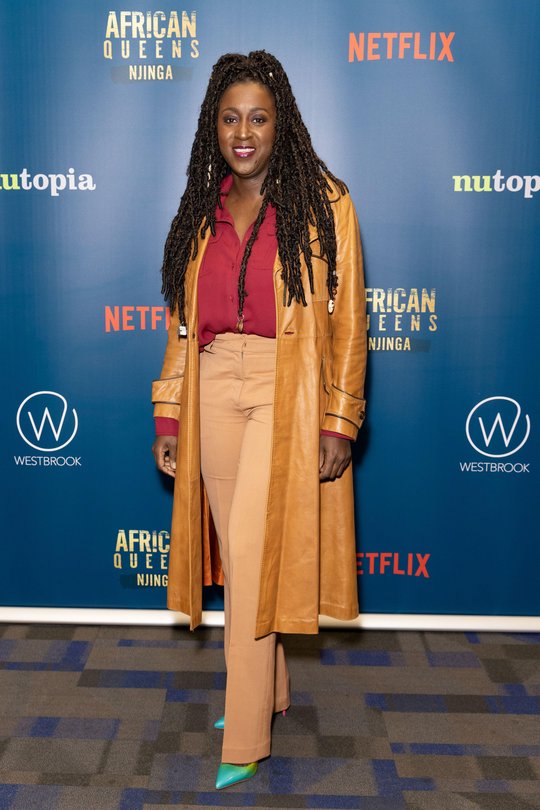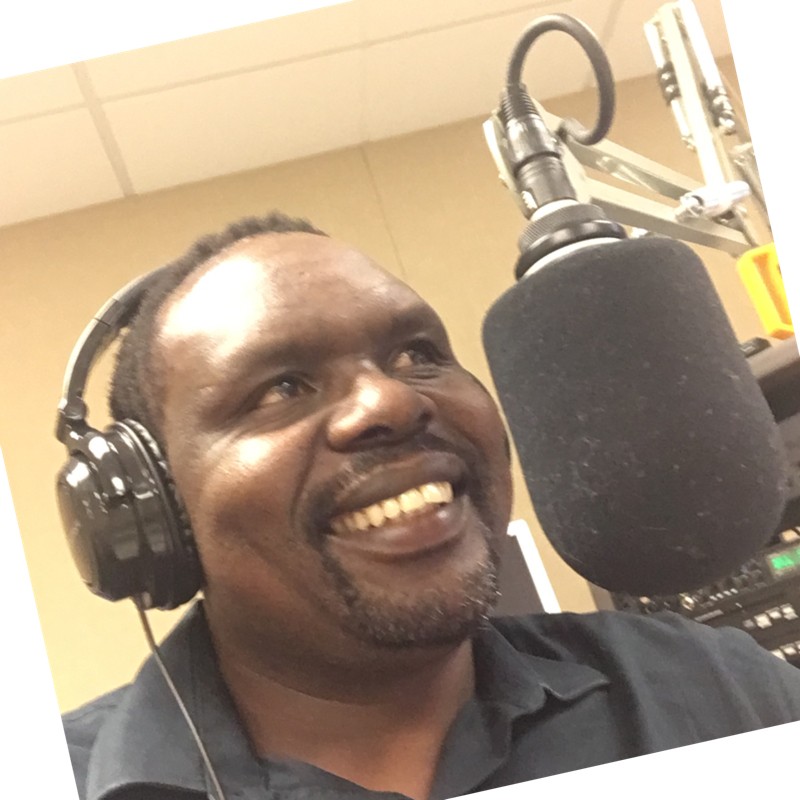
Peres Owino’s latest film series is the story of true pre-colonial African patriotism. It is the story of Njinga, the warrior queen who fiercely fought against the enslavement of her people by the Portuguese.
The series, known as “African Queens: Njinga,” debuted on Netflix on Feb. 15 and stars Adesuwa Oni, a London-born actress of Nigerian descent, as Njinga. Oni’s performance is so captivating that it’s difficult not to watch all four episodes in one sitting. Queen Njinga ruled the kingdoms of Ndongo and Matamba in present-day Angola from 1624 until her death on Dec. 17, 1663. It is a remarkable story of guts, resilience and willpower as European powers violently ripped apart the fabric of African communities and captured men and women for the trans-Atlantic slave trade. Owino, who co-wrote the series with Nigerian-born NneNne Iwuji, says such stories are important because they not only show what Africans endured, but also present the untold history of how powerful and smart the continent’s people are.
“I think the stories are very important to people of African descent because they show us who we are, not who we were,” Owino says. “The greatness of Njinga still lives in you because [she is your] ancestor.”
Jada Pinkett Smith, one of Hollywood’s most iconic celebrities, is the executive producer and narrator of the docudrama, which features commentary from present-day African royalty, historians, and archival records to create re-enactments of Njinga’s life and reign. Owino points to Njinga’s ability to outsmart rivals and get the Pope to validate her, which in turn leads to the king of Portugal to acknowledge the existence – and legitimacy – of her kingdom, as one of the victories that cement Njinga’s legacy. But getting there for Njinga isn’t easy for many reasons, the main being that she is a woman in a kingdom dominated by men.
“We told the story a head of state dealing with the sort of pressure that I’m glad I never had to deal with,” Owino says.
During the reign of her father, Ngola (King) Kilombo Kia Kaseda, Njinga develops the reputation of a skilled fighter who is also a trusted political advisor of her father’s. When her father gets assassinated, the pressures Owino is referring to begin. Her brother Mbande maneuvers his way to the throne, even though it is very clear to many that he doesn’t have the qualities it takes to be a strong leader who can protect his people against the Portuguese. After a defeat that nearly annihilates his kingdom, Mbande finally admits that he needs his sister’s help in protecting Ndongo. By then, the two siblings do not see eye-to-eye because of one act of Mbande betraying his sister in a way that cannot be revealed here without spoiling the story.
Despite their seemingly irreconcilable differences, Njinga agrees to help her brother to govern. But soon, Mbande dies of unclear – some might say, suspicious – circumstances. With Mbande’s son too young to take the throne, Njinga becomes the obvious leader of Ndongo. Like her brother, she employs some immoral tactics to consolidate her power.
“[She was] forced into this situation, where she had to make choices between options that were not really options – because two wrongs are not really an option,” Owino says. “And having no option is why you must decide how to save the little you can, because you don’t have the power to save it all. That kind of pressure is very destructive, and it leads to bad decisions and even worse outcomes.”
Njinga becomes the queen, not of only of Ndongo, but also of nearby Matamba, which she captures peacefully in 1631 by cajoling the leader of Imbangala – one of the fiercest mercenary armies in the region – into pledging loyalty to her royalty. In the end, Njinga mobilizes and commands an army of more than 100,000 fighters, which makes her a powerful player and forces the Portuguese and the newly arrived Dutch slave traders to negotiate with her.
Owino and Iwuji really deserve kudos for “African Queens: Njinga.” It is not often that an African women get the opportunity to write such an important documentary. But it’s not by accident either. She has earned it.

Owino is so passionate about filmmaking that several times during the interview she closes her eyes so tightly as she tells the story. Looking at what she has accomplished, one might think her filmmaking comes from watching tons of films in her childhood as is common in Hollywood. But her love for writing and storytelling began in Kenya at a time when getting access to films wasn’t easy. She was at Loreto High School when a schoolmate urged her to join Drama Club, as theater performance is known in her country of birth. The club traveled to different festivals competing against other high schools. During the process, she learned the writing skills that would later lead to a career in filmmaking.
“The good thing about growing up in Kenya and being part of the drama club is you had to write everything,” she says. “All the content you had to create had to be original.”
Later, Owino got a scholarship to study in the United States, at the University of Wisconsin in Green Bay. During her second year, she saw a post at the theater hall calling for actors to audition. She auditioned and got the role.
“So, I became a classically a trained actor,” she says.
Owino describes herself as someone who loves reading about all peoples, not just Africans. She has read extensively about Jews, Asians, and Europeans.
“I will sit [down] sometimes and be like, ‘I wonder what was going on in Ireland.’ And then I’ll just sit and read about Irish history,” she says.
By the time Owino came to the United States, she had read the biographies of Frederick Douglass, Dr. Martin Luther King, Jr., and Malcolm X, and had developed great interest in learning about slavery and the African American experience. One thing she wanted to do when she arrived was to share stories of Africa with African Americans, hoping they’d be just as fascinated about her history as she was about theirs.
“And it was upon arriving here that I realized that there was a little bit of tension between the two groups of people,” she says.
After graduating from Wisconsin, she moved to Los Angeles. There, Owino says she became friends with her neighbor, Xavier Green, a Howard University-educated African American filmmaker who died two years ago of pancreatic cancer. Owino says they used to have passionate conversations centered around the tensions between Africans and African Americans.
“I said, ‘OK, I’m gonna make a film about this so that I can give Africans and African Americans sort of conversation starter,” she says.
In 2014, “BOUND: Africans vs African Americans,” was released. The documentary, which was her directorial debut, brought together African immigrants and descendants of Africans slaves for candid discussions about the tension between them, which Owino says the is the result of each group having limited knowledge of the other’s history.
The gist of the conflict is that some Africans view African Americans as lazy people who do not want to take advantage of the opportunities their country has to offer. Some African Americans, on the other hand, say they resent Africans for having sold them to slavery.
“I felt like it was very important for us to understand each other’s story so that we meet each other, and have less judgment and more grace, because we understand where everybody’s coming from,” she says.
“BOUND: Africans vs African Americans” won several awards, including the Audience Award for Best Documentary at the 2015 Pan African Film Festival in Los Angeles. Owino has since made several other films, but “African Queens: Njinga” is undoubtedly the one that has introduced the world to what she is capable of.
Njinga’s isn’t just a story about the existence of a powerful woman ruler in Africa. It is a historical document that spotlights what has been left out of history books written by the true perpetrators of slavery and colonization in Africa. It bursts the myth that Europeans were just buying slaves from African sellers and shows the difficult choices leaders like Njinga had to make to save their people from mass murder and slavery.
“It’s at a pivotal point in African people’s history,” Owino says.
She adds that when making the series, they looked at Njinga, on multiple levels, not just “at her as a king.”
“We told the story of a mother, a sister, a queen, a politician, [and] we told the story of a freedom fighter,” she says.
Owino says she is optimistic that stories like Njinga’s will inspire Africans to start telling similar ones, in a continent that is abound with heroes like her. In fact, Owino’s collaboration with men and women from various African countries and the Diaspora in the making the Netflix series is evidence that Africans are already joining hands to tell their own story. Two to three generations from now, the world is going to have a very different image of Africa, she says.
“I’m not gonna live long enough to see it, but I think it’s going to be magical,” she says.
CORRECTION:
An earlier version of this story incorrectly stated that Owino was the director of “African Queens: Njinga.” It has been corrected to reflect that she co-wrote the series with NneNne Iwuji. We regret the error.
About Edwin Okong'o - Mshale Contributing Editor
Edwin Okong'o is a Mshale Contributing Editor. Formerly he was the newspaper's editor.








